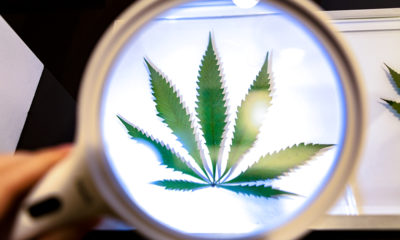Medical
Bud in the Bible Belt
Photo of rally in Athens, GA courtesy of Georgia Care Project
Many Southern medical cannabis supporters are fighting an uphill battle through political legislation and bureaucratic red tape in hopes that some form of compromise can be met. The movement for legal medicine reform seems to be taking an unexpected turn recently, with three Southeastern states having proposed significant changes to their current medical marijuana policies. The Southeastern coast isn’t typically thought to be the biggest breeding ground for supporters of medical marijuana reform, however, it seems as though these assumptions are far from the truth.
Lawmakers from South Carolina, Georgia and Florida have brought forth new proposals that will legalize the use of medical marijuana for qualified patients and decriminalize cannabis in the states.
South Carolina
A bipartisan group in South Carolina, led by house minority leader James Todd Rutherford, have proposed two new legal measures that would establish a working medicinal marijuana program and would decriminalize the substance throughout the state.
The two measures, House Bill 3140 and House Bill 3114, were submitted before the South Carolina House of Representatives earlier this month.
HB 3140 will establish the “Put Patients First Act,” which would allow qualifying patients suffering from painful and debilitating illnesses to legally possess and grow their own cannabis for medical use. Additionally, it will establish a new system for medical providers that helps them to ensure their patients are receiving the medicine they require in a safe and convenient way.
HB 3117 would essentially decriminalize cannabis throughout South Carolina, replacing the current criminal penalties with a civil fine similar to an average parking ticket. This measure allows citizens of the state to carry up to one ounce of marijuana on their person without the danger of facing serious criminal charges for drug possession.
South Carolina lawmakers already passed a similar bill, Senate Bill 1035, last June. However, it only allowed for CBD-based cannabis products to be given to patients that suffered from severe epilepsy and lacked a system in which patients could actually obtain their medicine from a licensed professional. Many residents found this bill to be far too restrictive and didn’t approve of it being the only step the state has taken toward reform.
The new policy measures could soon make South Carolina one of the first Southern states to establish a statewide medical marijuana program, hopefully blazing the trail for more states to follow.
Georgia
Republican Representative Allen Peake officially filed House Bill 1 to legalize the use of low-THC cannabidiol oil to qualifying patients who suffer from cancer, seizures, epilepsy and a number of other chronic illnesses. House Bill 1 would essentially establish four new measures that would protect Georgians from being prosecuted for possession of medical marijuana.
Peake has been working to come up with some kind of compromise with Governor Nathan Deal, who has been adamantly opposed to a medical marijuana program in Georgia. But with almost 100 co-sponsors backing him on HB 1, Peake feels fairly confident in its success and claimed that he’s hoping to make a deal with a marijuana manufacturer in order to figure out how to ship the cannabidiol oil to Georgia.
He explained, “We’d be able to ship it because it’s so low in THC that it’s considered a hemp product.”
However, finding a company to work with the state hasn’t been as easy as it seems. According to Peake, the marijuana manufacturing companies are “only sending it to states where immunity is in place.”
The second aspect of the bill would allow qualifying patients to drive to neighboring states to purchase their medicine and be able to return home with it, free from any form of legal prosecution.
Peake said that he has been speaking with Governor Deal to work with the DEA and the Justice Department to obtain a state exemption for Georgia. This would grant the state permission to initiate interstate transfer of medical marijuana and similar substances like CBD oil. If these options fail, Peake has one last option up his sleeve.
“You know what, it may be time for some good old civil disobedience,” said Peake. “Maybe it’s time for someone like me to go to Colorado, go to a legal state, obtain the product and bring it back to Georgia in violation of Federal law and maybe possibly getting arrested.”
While Georgia may not be fully legalizing medical marijuana anytime soon, this is definitely a step in the right direction.
Florida
Florida state Senator Jeff Brandes has proposed a new bill, State Bill 528. The highly impressive 28-page document provides a clear and detailed explanation of a possible medical marijuana program to be implemented in the state.
The bill, known as The Florida Medical Marijuana Act, would allow any licensed physician within the state to prescribe medical marijuana to a qualifying patient.
SB 528 arose just a few months after Amendment 2 failed to pass because it fell just short of the necessary 60 percent to pass, receiving a close 57.6 percent of voter support. Amendment 2, nicknamed “Charlotte’s Web,” received Governor Rick Scott’s signature in the end, but has still yet to go into effect due to court challenges and other bureaucratic restrictions.
The “Charlotte’s Web” measure is considered to be highly restrictive, only allowing for low-THC strains of marijuana to be given to patients with epilepsy. Additionally, the measure is very vague in its construction, creating confusion over how the law would be enforced properly.
Brandes’ bill lists nine specific diseases that qualify a patient to receive medical marijuana treatments, including cancer, HIV, AIDS, ALS and epilepsy. Along with these, the bill lists five chronic conditions under which a patient can qualify, such as persistent pain or nausea.
Along with specifics and well-worded definitions regarding who can qualify to receive medical marijuana, the bill provides detailed regulations concerning the cultivation and dispensing of the products.
“Many groups have been working on this initiative for quite some time,” Brandes said. “And my goal is to work openly with all of the interested parties on this issue so that we can pass responsible legislation that provides relief to those Floridians in need.”
Despite the bill’s highly-detailed structure and specific outlines, it’s still meeting opposition. The Florida Sheriffs Association opposed Amendment 2, but have yet to make a comment on Brandes’ new bill because they are still reviewing it.
Overall, Brandes has proposed one of the most detailed medical marijuana plans to date, and, by the looks of it, has created a fine example for more state lawmakers to follow.
Do you live in a southern state that you think should legalize cannabis? Tell us where you’re from and how medical marijuana could help you in the comments.





















